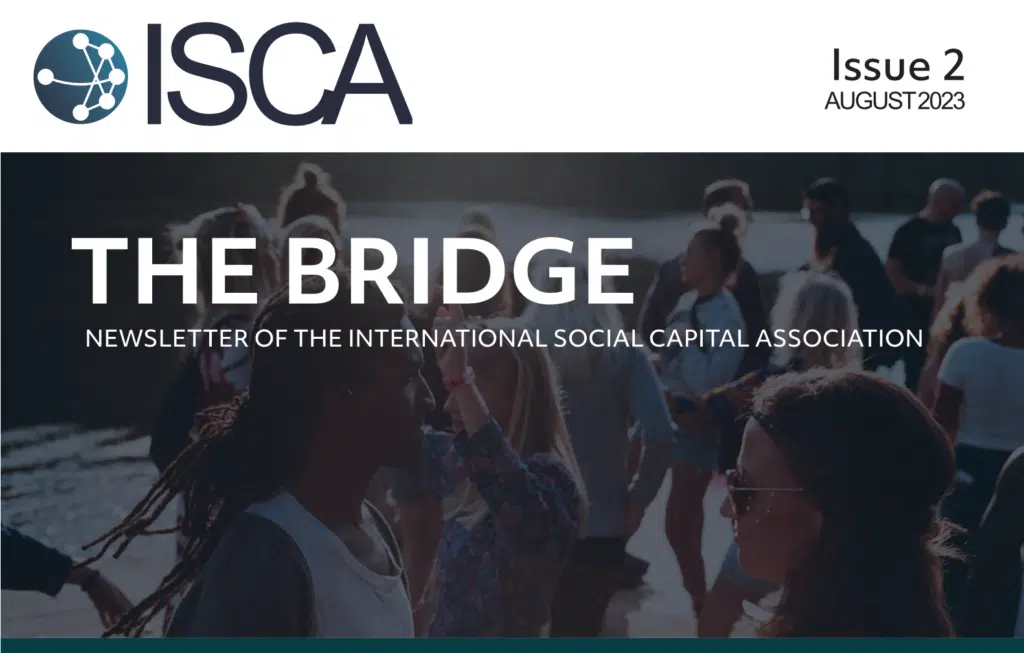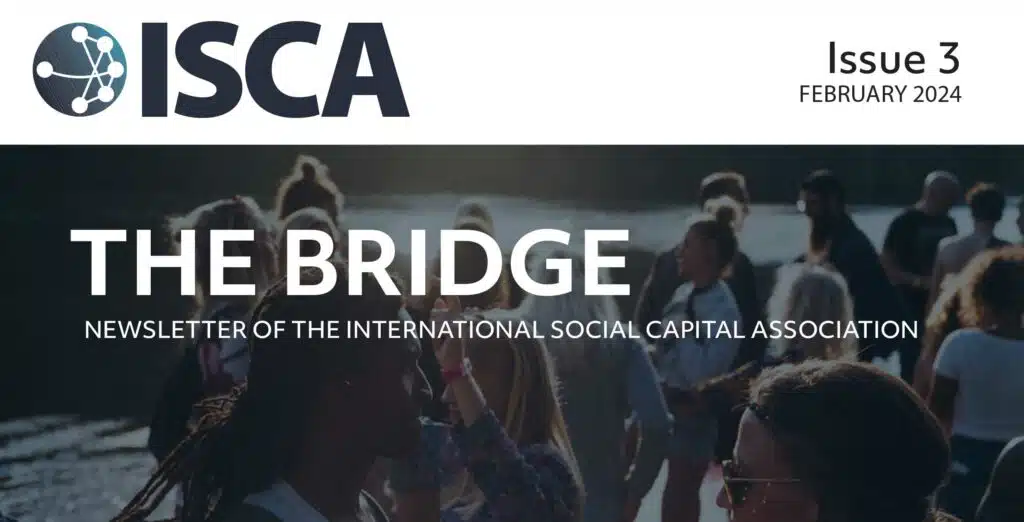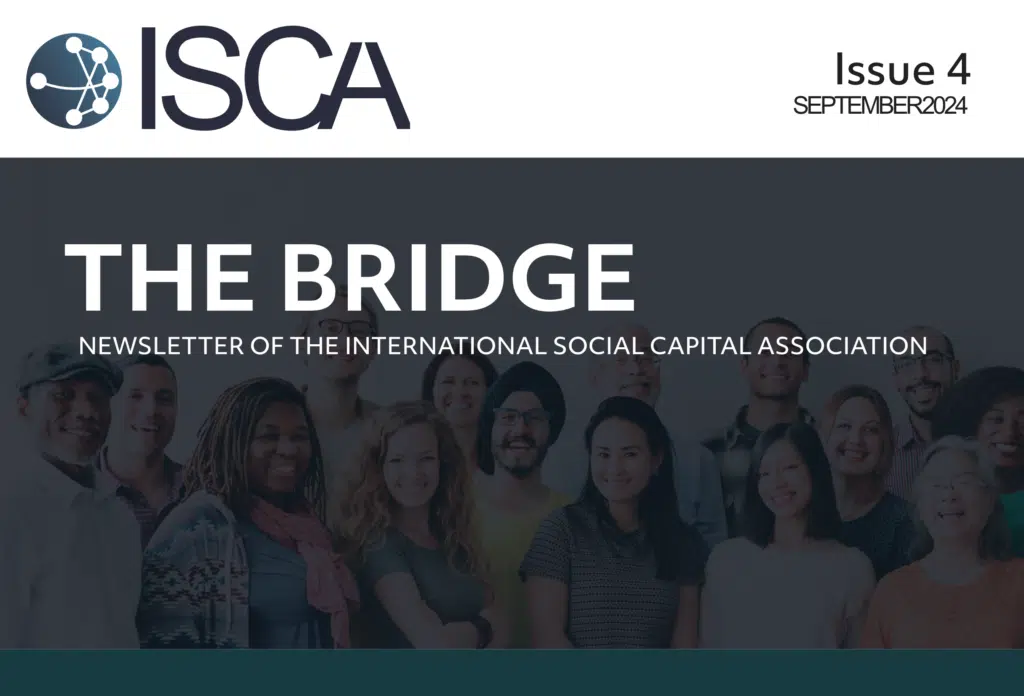Welcome
Dear Esteemed Members and Colleagues,
Welcome to the latest edition of The Bridge – Newsletter of the International Social Capital Association. As we embark on this journey of knowledge exchange and scholarly discourse, we are delighted to bring you a curated collection of insights, updates, and accomplishments that reflect the vibrant spirit of our academic community.
This edition will feature an interview with Dr Rahmat Shazi, a valued member of ISCA and regular facilitator of our Social Capital in Industry sessions.
We are also very excited to announce that the social capital stream will again be part of the Sunbelt conference in Paris in June, as well as a reminder about our first international conference on social capital to be held in Dubai in 2026.
We would like to thank all our members for their commitment and involvement in ISCA. And we’d like to hear from you and get your input on our future plans. Your dedication and enthusiasm continue to shape the International Social Capital Association (ISCA). Your invaluable support fuels our mission to create a platform where ideas and connections flourish.
Download a PDF of this newsletter
Member Highlight
Unlocking the Power of Social Capital: The Data-Driven Approach of Shazinnovation
ISCA member and entrepreneur Rahmat Shazi is redefining how businesses understand and measure social capital. With an engineer’s precision and a storyteller’s ability to make complex ideas accessible, he bridges the gap between hard data and human relationships. Whether explaining organizational networks through Lego blocks, leadership styles using Star Trek, or trust dynamics with classic Western films, Rahmat brings social capital to life in a way that resonates across industries and cultures.
Measuring the Intangible: The Science of Social Capital
Many business leaders believe trust cannot be measured—but Rahmat’s company, ShazInnovation, has the data to prove otherwise. A former engineer turned social capital consultant, he has developed groundbreaking tools that quantify trust, communication, and collaboration within organizations. These elements, often considered intangible, are critical to success, and his firm has pioneered methods to map what he calls “the good, the bad, and the ugly” networks in a company.
Using sophisticated measurement tools, ShazInnovation identifies trusted collaborators, friendly but unreliable colleagues, and power players whom others hesitate to challenge—much like the characters in a Clint Eastwood movie. Unlike Lego blocks, which fit together predictably, organizational relationships are complex, requiring rigorous analysis to understand their true impact.
Data-Driven Insights That Challenge Conventional Wisdom
Rahmat’s research consistently finds that trust is the most crucial factor in business performance. “Statistically, it keeps popping up all over the place,” he explains. However, his data reveals a surprising insight: too much trust can lead to complacency and subpar results. Understanding this inflection point is key to optimizing organizational dynamics.
His findings have challenged traditional business practices. Social capital measurements at a multinational semiconductor firm in Malaysia demonstrated that steady, conscientious individuals often outperformed dominant personalities in leadership roles—contradicting results from traditional DISC psychological assessments. Rahmat and his team engaged in what the company calls “constructive confrontation” and won them over with undeniable data. “We showed them the numbers, and they couldn’t argue with the results,” he recalls.
Adapting Social Capital Across Cultures
Having worked within diverse corporate landscapes—including U.S. operations and various Asian business cultures—Rahmat has gained deep insights into how social capital functions across different environments. He notes that Asian business cultures are particularly receptive to structural aspects of social capital due to their emphasis on cooperation. This was especially evident during the COVID-19 pandemic when collective responses took precedence over individualism. Like his favorite Star Trek captain, Jean-Luc Picard, Rahmat believes great leadership isn’t about dominance—it’s about orchestrating complex networks of relationships toward a shared goal.
Transforming Leadership Through Measurable Data
Convincing top management to embrace social capital measurement isn’t always easy. “A lot of leaders believe their success is based on an unquantifiable magic that no one else can replicate,” Rahmat observes. His approach reframes the conversation: “Our analysis gives you more power because now you can justify your intuitive observations with real data.” His firm’s tools translate gut feelings into measurable insights, helping organizations replicate successful patterns of collaboration and trust-building.
Shaping the Future of Business with Social Capital Metrics
Beyond individual companies, Rahmat’s work is making a national impact. Through his involvement with the Malaysian Productivity Corporation, he is integrating social capital metrics into Environmental, Social, and Governance (ESG) frameworks, helping businesses invest in human networks as part of their corporate responsibility strategies. His ability to quantify the intangible is transforming how businesses approach teamwork, leadership, and organizational resilience.
Rahmat envisions expanding this work globally, refining even more advanced measurement tools to assess social capital’s impact across different corporate cultures. “As the famous adage goes, what we can measure, we can manage,” he emphasizes. By applying data-driven insights to the complexities of human interaction, Rahmat Shazi is proving that the science of social capital is not just about numbers—it’s about building stronger, more resilient organizations that thrive on trust, collaboration, and strategic relationships.
Sunbelt 2025
We are delighted to announce that there will be a Social Capital Stream again at the INSNA Conference, with a strong contingent of ISCA members. We encourage you to attend this event and we hope to see you there.
Sunbelt 2025 — June 23-29, in Paris, France
“Social Networks, Mechanisms, and Algorithms”
Abstract / Poster Submission Deadline: Feb. 20th, 2025.
REGISTRATION IS OPEN NOW ON INSNA WEBSITE: https://www.insna.org/events/sunbelt-2025–paris/register
The Sunbelt 2025 in Paris (June 23-29, 2025) will be held at the premises of Sciences Po Paris for the Workshops and at Sorbonne Université for the Conference, approximately from 8 am to 7 pm CET.
The final Program will be circulated by the end of May 2025, together with further practical information.
Sunbelt Workshops
June 23-24, 2025
Sciences Po
1 place Saint-Thomas d’Aquin 75007 Paris, and 13 rue de l’Université, 75007 Paris
Sunbelt Conference
June 25-29, 2025
Centre International de Conférences de Sorbonne Université
Sorbonne Université, Campus Pierre et Marie Curie
4 place Jussieu, 75005 Paris
Simmel Award lecture (Beate Völker) and cocktails:
26 June 2025, 17h
Grand Amphithéâtre de la Sorbonne
47 rue des Ecoles, 75005 Paris
2026 ISCA Conference
As we announced last year, ISCA will hold its first international conference on social capital in Dubai in February 2026. The tentative details are as follows:
February 19-22, 2026
Heriot-Watt University
Dubai, United Arab Emirates
Further details will be available soon. Please save the date and register your interest to receive updates.
The conference will include keynote presentations by leading scholars, submitted presentations and posters, workshops and learning opportunities, and social activities and events.
Recent Research Articles
Three recent social capital studies show how workplace relationships change and adapt in changing work environments. Newly hired employees, both in-person and remote, as well as employees experiencing intermittent absences from work all rely on the social capital they have within their networks to strengthen their organizational connections.
Boulamatsi et al. (2024) studied how new hires create social networks in their new work environments in several companies in China. Future-focused employees invest more in proactive networking with co-workers, and greater connections are made with supervisors and their networks. Formal organizational structures can either support or limit these efforts to build social capital, which can affect how organizations can encourage social capital development. This has implications especially in light of high turnover in workplaces.
Absenteeism is another result of this volatility, shown by Pihl-Thingvad et al. (2022) in their analysis of employees in the public sector. As before, strong vertical relationships — with supervisors and other organizational leaders — play a crucial stabilizing role, more than those amongst peers. “Linking” with upper-level management created the strongest resistance against absenteeism. “Bridging” relationships across teams had some modulating effect, but “Bonding” ties with teammates had the least effect, possibly because close relationships could make taking sick leave more socially acceptable. The authors also noted this was more prevalent in the public sector than in private companies in Denmark, where their study took place.
Absence of a different sort was studied in D’Angelo et al.’s (2024) study of remote workers’ development of virtual social relationships at an Italian technology firm. The established workforce shifted to completely remote during the COVID-19 pandemic, and additional workers were hired subsequently. These newcomers reported similar challenges to those in Boulamatsi et al.’s study, finding it difficult to connect with coworkers in a virtual environment. One participant noted, “It’s not like you make a call to talk about nothing or to chit-chat.” New members of the team had a harder time learning “those unwritten rules that are learned by living in the environment” (p. 8). This research highlights fundamental questions about how businesses can support social capital across different working environments and arrangements.
Whether due to sick leave or remote work arrangements, physical absence impacts both the development and maintenance of social capital. Both forms of separation from the workplace appear to impact informal relationships significantly.
As social capital researchers and practitioners, we are uniquely positioned to appreciate these dynamics. These studies, and the ones listed below, present exciting new questions and answers about how social capital impacts our world, inviting further exploration of these themes across different contexts and cultures.
Boulamatsi, A., Liu, S., Zhou, L., Yin, J., Yao, X., & Guo, R. (2024). Newcomers building social capital by proactive networking: A signaling perspective. Journal of Applied Psychology, 109(10), 1555-1570. doi:https://doi.org/10.1037/apl0001187
D’Angelo, C., Negro, A., & Cassarino, I. (2024). The Relationship between Smart Working and Workplace Social Capital: An Italian Case Study on Work Sustainability. Sustainability, 16(14), 6033. https://doi.org/10.3390/su16146033
Pihl-Thingvad, S., Winter, V., Schelde Hansen, M., & Willems, J. (2022). Relationships matter: how workplace social capital affects absenteeism of public sector employees. Public Management Review, 26(4), 1033–1060. https://doi.org/10.1080/14719037.2022.2142652
Get Involved
Visit the ISCA events page for Interest Group schedules and access.
https://www.intsocialcapital.org/events/
- ISCA Webinar Series with Tristan Claridge
- Disaster Resilience with Jeff Donaldson
- Social Capital Paradigm with Tristan Claridge
- Research Design and Mentoring with Beverly Sloan
Mighty Networks
Our community platform has been a bit quiet lately, so we have decided to improve access by making it available to non-members as well as members. This means you can invite people to join, even if they are not a member of ISCA. This will remove the barriers to participation and encourage more people to get involved. As our interest groups start to develop, this will be important to provide an easily accessible platform for interest group discussions. To invite someone to our Mighty Networks community, go to https://community.intsocialcapital.org/invite and copy the link or you can invite people by email directly from that page. Be an ambassador for our association and get recognition for helping us grow.
ISCA Webinar Series
Our webinar series has been running since April 2020 with presentations by prominent scholars and practitioners, including Prof Robert Putnam, Prof Eric Uslaner, Prof Lindon Robison, Prof Daniel Aldrich and many more.
Our webinar series provides a platform for people to share their research or their practical applications of social capital with an international audience.
Click here to submit a proposal to present in the ISCA Webinar Series.
Visit the ISCA events page to register for upcoming webinars.
Recent webinars
Social capital in academia: measuring researchers’ collaboration preferences versus habits
Alesia A. Zuccala – https://youtu.be/EfbZ19smn3A
Connecting Societal Sectors along the Disaster Continuum
Panelists: Timothy Little, David Savarese, and Jeff Donaldson (Moderator) – https://youtu.be/8E7NXNWiNGY
The relationship between social capital and urban design
Monique Cowan – https://youtu.be/GBP4Cr7z–I
Building Social Capital: A system engineering approach
Carlos Vignolo and Álvaro Contreras – https://youtu.be/o5MHb8wgIyI
The Relationship between Social Capital and Health Outcomes in a Southern Rural Population
Lauren Bigger – https://youtu.be/MMWQ7_U9d3U
The strengths and weaknesses of social capital in Guernsey
Tristan Claridge – https://youtu.be/VyfefvguVp8
Inter-school social capital: lessons for leaders how to maximise benefits of networks & networking
Ruth Luzmore – https://youtu.be/WyOGzurRmW8
Healthcare network governance and accountability shaped by social capital
Mara Sintejudeanu – https://youtu.be/_VsEeXxTo1o
Weaving together social capital to empower women artisan entrepreneurs
Garrett Brogan – https://youtu.be/XaoD-MeNWD0
Share your work
Are you using social capital theory in your research and public-facing writing? Please submit information about your work so we can share it on our website. Listings will not include the full text, but links to text or downloads can be included. Go to this survey to submit.
Stay in touch
We would love to hear from you and answer any questions you have about ISCA. ISCA board members can be contacted through the Governance page.




